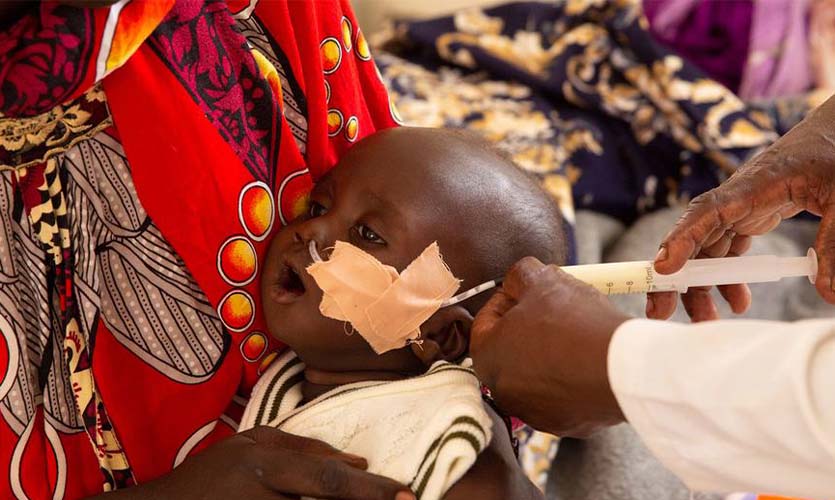As the conflict in Ukraine drains funding from the world’s youngest country and causes prices of staples to soar, the food assistance branch of the United Nations – the World Food Programme (WFP) – has suspended aid to 1.7 million people in South Sudan. More than 6 million acutely food-insecure individuals in South Sudan are expected to receive emergency food assistance this year, as they did in 2021, although with smaller rations, according to the UN.
The WFP said that it would now have to prioritise 4.5 million of the most vulnerable people to prevent them from dying of starvation during the lean season from April to July, a major cut likened to humanitarian triage.
“It’s a drastic cut because it’s a third of the total of people that we know require food assistance, but we had to do a kind of triage if you will. We had to decide who to keep assisting and who we can afford to suspend the assistance from – not because they’re not in need but because they can survive,” said WFP spokesperson Marwa Awad, in South Sudan’s capital city Juba.
“They are food insecure… and if aid is not given to support them, they will slide further down the scale of hunger and reach starvation level. If people are not nourished and are not reached regularly, they will get worse and worse and join the ranks of their brethren who are already looking death in the eye,” added Awad, concerned over the 1.7 million people without assistance, as per the Guardian.
1,78,000 of the poorest children will lose free school meals as a result of this reduction. Due to the suspension, Awad had already heard from colleagues on Tuesday that parents planned to pull their children out of school and put them to work. There were also reports of child marriages, a common byproduct of humanitarian crises.
South Sudan, which has already produced Africa’s worst refugee catastrophe, is on the verge of resuming a full-fledged civil war. War crimes, including rapes and beheadings, are being perpetrated at an alarming rate, in an increasing number of locations. Looting of humanitarian assistance supplies and assaults on relief workers are on the rise. The country is still experiencing violence on a regular basis, along with climate shocks such as catastrophic flooding and localised drought.
According to the WFP, at least two out of every three individuals in South Sudan are facing major humanitarian and protection crises, and require assistance to live. It is anticipated that about 8.3 million people, including internally displaced people (IDPs) and refugees, could face acute severe hunger throughout the lean season. The news comes as people brace for the fourth year of flash floods, which has rendered wide areas of land sodden and agriculture unworkable in states like Jonglei, Upper Nile, and Unity. Flooding in South Sudan forced one million people to flee their homes in 2021. This year, it is anticipated that 600,000 people are in the path of rising flood levels, and face relocation.
The Russian incursion into Ukraine has increased the strain in a variety of ways. Specifically, assistance is diminishing as nations hurry to contribute substantial funds to fulfil Ukraine’s tremendous humanitarian needs. According to Awad, “Donors are no longer actively supporting South Sudan as a crisis.” Compounding the lack of cash is the pressure from rising prices for necessities such as wheat and sunflower oil, both of which are traditionally produced in Ukraine. As a result of the high price of wheat, the cost of alternatives such as sorghum and maize has risen by as much as 59 percent in South Sudan. She noted that rising gasoline prices have also put a strain on the WFP’s operations in the nation, where only around 2 percent of roads are paved. The government has determined that an additional $2.8 million is required merely to cover food shipping costs.
Read more: Protesters Demonstrate Against Alleged Abduction Of Baloch Students In Karachi
Overall, the WFP estimates that it will require an additional $426 million (£352 million) to resume its full projected programme of food aid for the following six months. Awad explained that the World Food Programme has a presence in the most difficult-to-reach locations and hence, can “make a difference” with this funding. “But we need donors to be generous again and to support people here,” she added.
According to the most recent Integrated Food Security Phase Classification (IPC) assessment, 7.74 million South Sudanese could endure severe acute hunger throughout the lean season, with 1.3 million children critically malnourished. Among the 4.5 million individuals who will continue to receive WFP food rations this year are 87,000 people who are already suffering from catastrophic hunger, and are living in famine-like conditions.
The UN agency needs $426 million to reach 6 million food insecure individuals over the next six months, in order to assist in disaster response and resilience-building.










